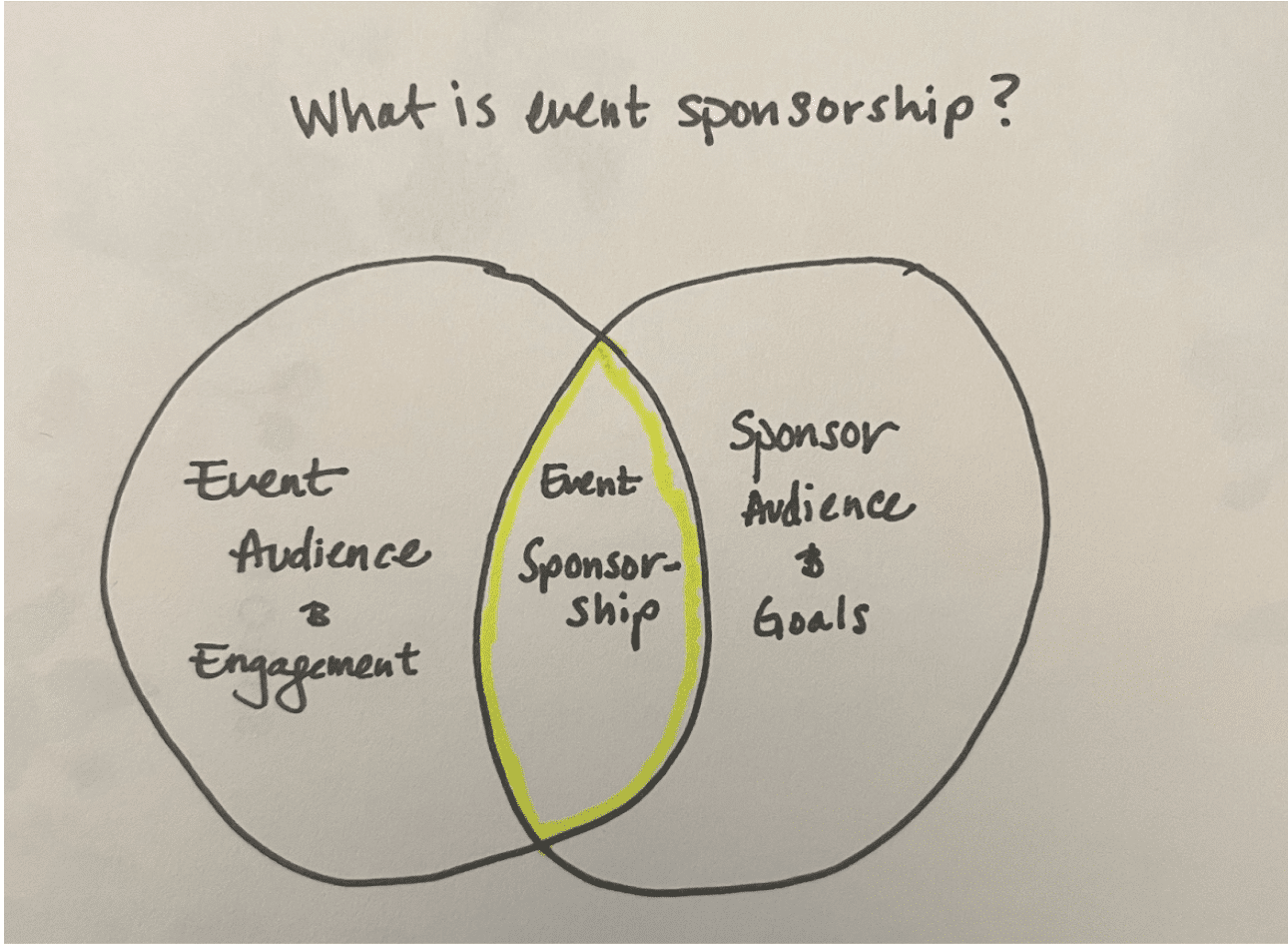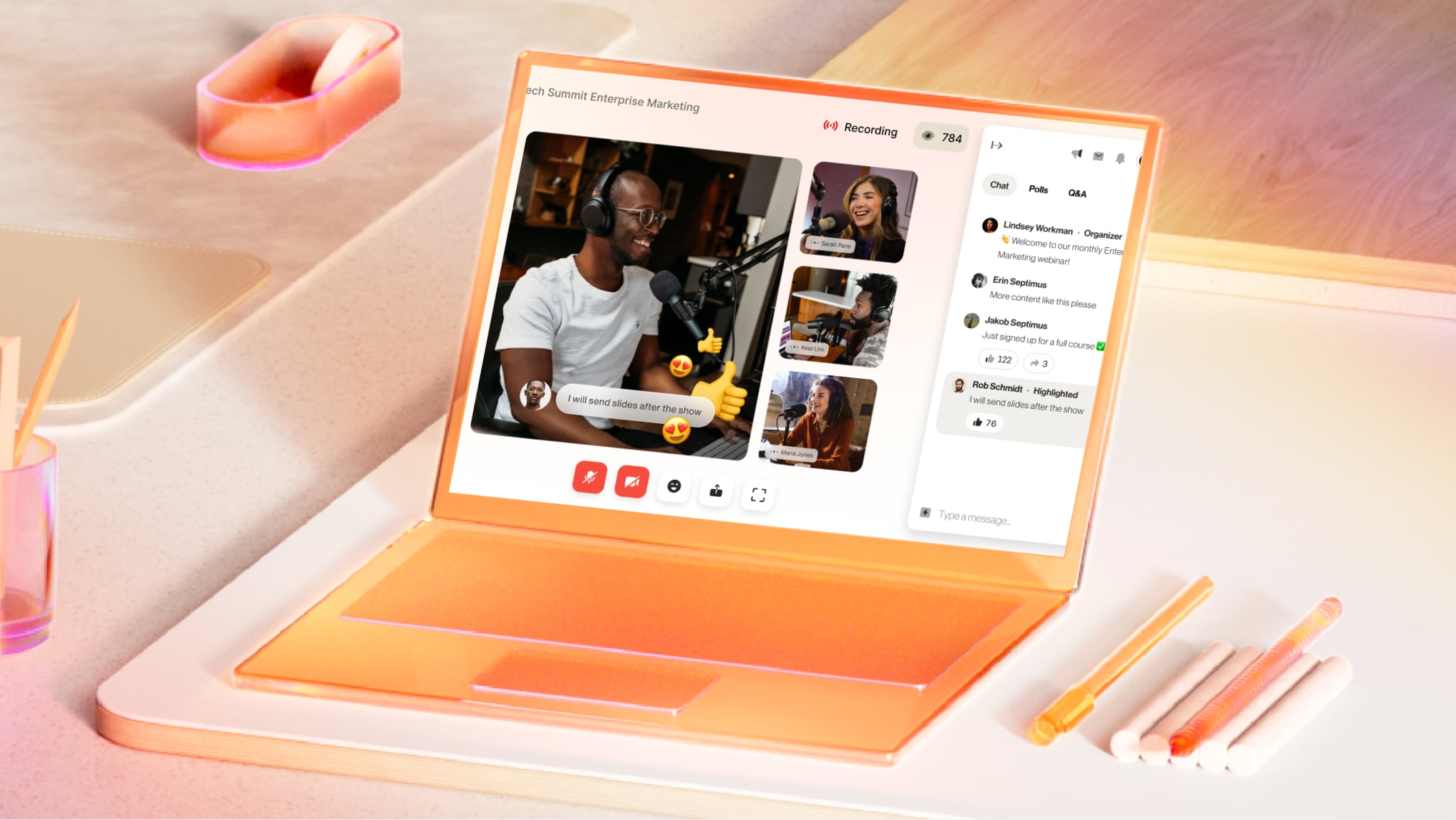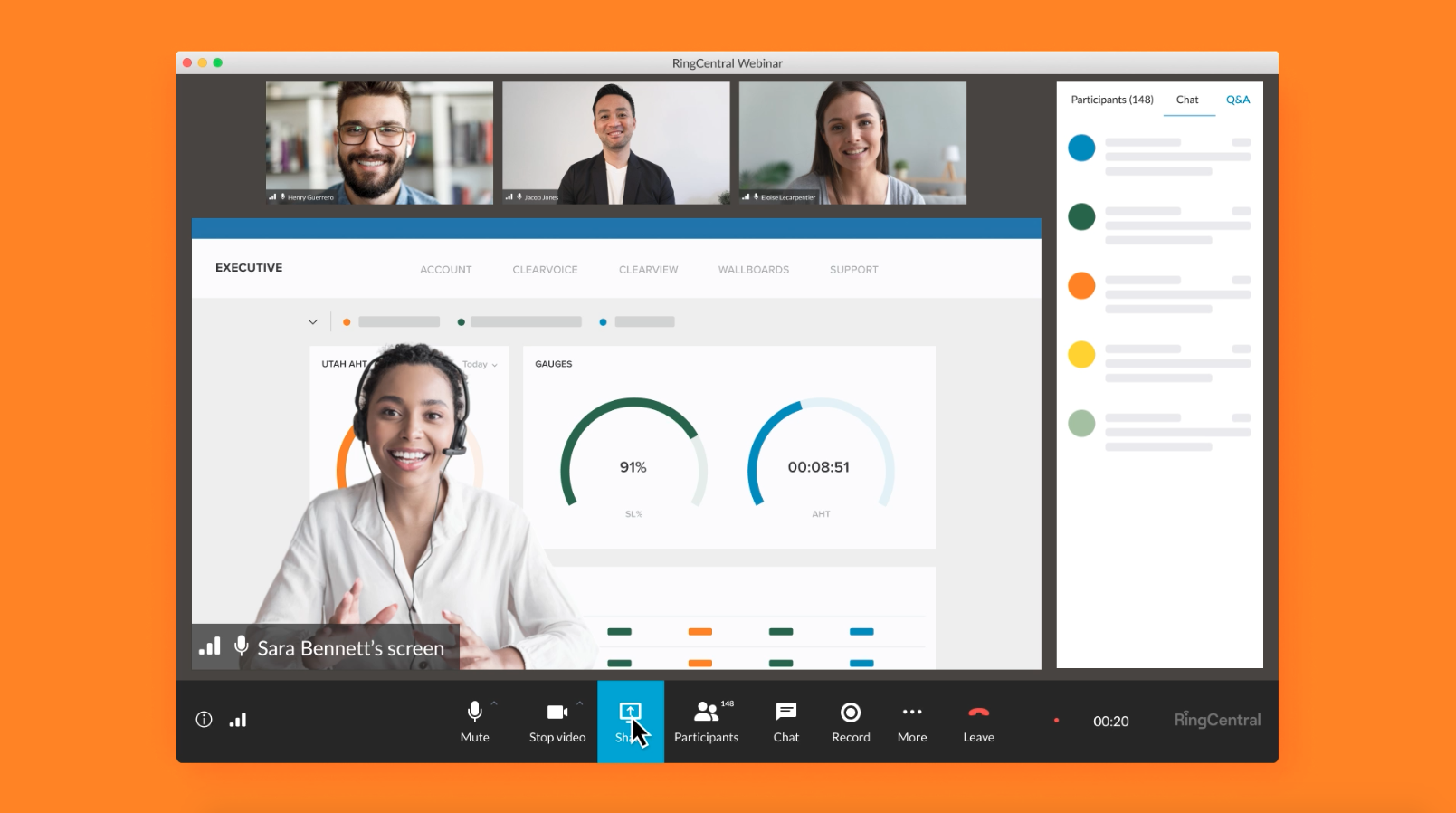Hopin is now RingCentral Events
Event sponsorship is, for all intents and purposes, the exchange of funds for access to an event audience. For example, let’s say your company wants to announce a new and exciting product during the keynote at an industry conference. To do this, you’d pay its organizers for the chance to score some early customers at their event.
Sounds simple, right? Well, according to sponsorship veterans Larry Weil and Chris Baylis, there’s more to this billion-dollar industry than sponsored keynotes.
Larry is the Sponsorship Guy and Chris is the president and chief executive officer of The Sponsorship Collective. Collectively, they have multiple decades of experience. And while they may disagree on some things, they strongly agree on one thing — achieving event sponsorship success these days is not quite as simple as it used to be.
In this guide, they’ll show you how to win event sponsors today and retain them. Let’s go!
In this guide, you’ll learn how to:
- First, avoid common event sponsorship pitfalls
- Take a more strategic approach to finding and securing event sponsors
- Unlock meaningful engagement to increase ROI for event sponsors
- Give your event sponsors a reason to renew (again and again)
- Offer your event sponsors stability during uncertainty
1. First, avoid these common event sponsorship pitfalls
Event sponsorship is a competitive field. For example, almost half of event organizers in the United States report event sponsorships as a top source of revenue. And according to Larry, other events are just the tip of the competitive iceberg.
“Today’s event professionals are also competing against anything sponsors could spend their money on to achieve their goals — from online and social media advertising to affiliate marketing,” he says.
That’s right. The brands you want to sponsor your events aren’t just deciding between you and your event’s direct competitors. They’re also comparing your sponsorship opportunities to those offered by YouTubers and TikTokers.
With this in mind, your path to event sponsorship success begins with understanding some common pitfalls, such as:
- Altruistic or one-way agreements: While goodwill may be the cherry on top, event sponsorship is always a two-way street if both parties want to extract mutual value. Sponsors only invest in events — or anything else for that matter — that promise to produce meaningful results.
- A one-off logo placement or banner: Companies have many cost-effective options to build awareness, especially compared with the price of event sponsorship. To justify their spend, event sponsors need something of comparable value in return. And Chris explains, “it is not the act of putting logos on crap.”
- An event planning afterthought: No sponsor with skin in the game wants to be tacked on at the end of the planning process. To increase your odds of success, get started on event sponsorship early. “Give yourself enough time to find sponsors and to weave them into your event’s overall engagement strategy,” Larry suggests.
It’s easy to see the advantages of staying ahead of potential mistakes. But understanding them won’t help you avoid them, which begs the question…
So, what do sponsors really want?
In today’s digital-first era, brands that sponsor events want access to their target audience and the opportunity to meaningfully engage them. As Chris puts it, “Audience is to event sponsorship as cold is to snow. You can’t have one without the other.”

Why are sponsors interested in engaging with today’s event communities? According to Larry, it’s simple. “Sponsors seek to tap into the audience’s affinity with your event,” he says. “They seek to borrow your halo.”
The positive associations and feelings your attendees have for your event unlock a sponsor’s desired outcomes, like:
- Corporate social responsibility: Brands looking to bolster their public image, as a means of increasing profits, might seek to sponsor events hosted by nonprofits or other philanthropic organizations.
- Early traction for product launches: Companies seeking potential buyers for new products or services might look to sponsor events to generate interest and support the launch of their latest offerings.
- Brand awareness and credibility: Event sponsorships can help brands gain the exposure they need to achieve their sales objectives. This may be especially relevant for companies entering a new market, preparing to go public, or looking to land large corporate accounts.
These outcomes, however, are almost always tied to one outcome that rules them all. “At the end of the day, one event sponsorship outcome that rules all others is driving sales – directly or indirectly,” Chris says. “So take return on investment (ROI) seriously.”
2. Take a more strategic approach to finding and securing event sponsors
If 2020 taught us anything (the understatement of our time), we learned that virtual events can be inexpensive, inclusive, and interactive. But with online events and marketing channels now on every corner, it takes a thoughtful and data-driven strategy to stand out in the crowd.
Wondering how you can rise above the competition? Consider taking a more methodical approach to finding and securing event sponsorships. And learn how to convey why your event is a win-win scenario for attendees and prospective sponsors alike.
Do your research
Finding event sponsors begins with doing some homework. Where to start? You guessed it: Your event audience.
Our experts say the best way to pique sponsor interest is by highlighting the value of your event community. They suggest expanding what you know about your event audience by taking a data-first approach. And creating two to three attendee personas to help bring your audience to life for prospective sponsors.
“You’ll want to have 25 to 30 data points on your audience,” Chris says. “Be sure to have insights on who attendees are, what they want, what they’re interested in buying, their interests, and their values.”
Beyond their event platform’s insights, event professionals can also tap into the following sources to weave data into their approach:
- Google Analytics: Understand website visitor trends and shared behaviors to get a pulse on an audience’s online habits.
- Email marketing platforms: Learn about popular topics and shared interests by analyzing email campaign data.
- Google Alerts: Discover top media outlets and new stories relevant to your event audience –– all delivered to your inbox.
- Survey tools: Create survey questionnaires to send your audience to understand their needs, desires, values, and the like.
- Social media accounts: Find out what drives engagement with your audience by looking at your social media account analytics.
Equipped with an in-depth audience understanding, you’re ready to start searching for potential sponsors. Since access to audiences is top of the list for potential sponsors, be on the lookout for companies whose potential buyers, amplifiers, or influencers mirror your attendee audience.
Here are some ways to help you identify potential sponsors to target:
- Search event sponsor marketplaces and websites, like SponsorMyEvent and SponsorPitch, to find prospective sponsors to engage based on their audience and needs.
- Look at past events different brands sponsored to determine if your event might be a good fit for their audience.
- Scour articles and corporate websites to get a feel for prospective sponsors’ target audience and marketing initiatives your event can support.
Want a success shortcut? If your event budget allows, you can engage with experts like The Sponsorship Guy or The Sponsorship Collective to guide your sponsorship efforts.
Once you’ve found a set of initial companies to target, do some research by job title on LinkedIn to determine the best people to approach. Then, get ready to spend some time reaching out to these folks to gauge their interest in sponsoring your event.
Personalize your outreach
Do you open every email that hits your inbox? Probably not. With that in mind, aim to be thoughtful in your approach so potential sponsors will actually click on your message.
Avoid taking a blanket approach to your outreach or you’ll wind up lost in the noise. Instead, Larry suggests tailoring your pitches to prospective sponsors.
“Incorporate what you’ve gleaned about your target sponsors into your personalized outreach,” he advises. “Get at that thing that indicates [metaphorically speaking] their desk is on fire and you’re selling fire extinguishers. Show them that you understand their challenges and have just the solution for them.”
Here’s how to ensure your outreach emails don’t get lost in an inbox abyss:
- Keep your emails short and sweet
- Use catchy, must-click subject lines
- Highlight audience data and key value points
- Include a prompt to connect in every email
- And, of course, avoid getting your communications caught in spam filters
“It typically takes eight to 10 [outreach] touches before someone will respond,” Larry says.
He suggests planning for additional follow-ups and encourages event professionals to give folks a ring. Sometimes a phone call can add a personal touch that’s difficult to ignore. And don’t forget to leave a voicemail as an extra reminder to connect.
Once potential sponsors see you as an ally who will help them solve their problems, they’ll be eager to hear what you have to say. But first, you have to get their attention.
Start with a one-page proposal
The most recent research from 2006 suggests consumers were exposed to 5,000 marketing messages a day. Today, many digital experts agree this number may be closer to 10,000.
One way to cut through all the clutter and grab your recipients’ attention? Less is more according to our experts.
“People often put everything they can think of in the initial outreach and proposal because they’re concerned that whatever they leave out would have closed the deal,” Larry says. “When in fact, the opposite is true.”
So instead of throwing everything at the wall to see what sticks, consider creating a one-sheeter to send along to prospective sponsors. This is a document that brings your audience data to life in the form of infographics or other graphical designs.
“Keep it simple,” Chris suggests. “Outline your audience, include a mini case study showing how you helped brands achieve their goals, and always have a very strong call to action.”
Outbound outreach is a numbers game. But focusing on your in-depth event audience understanding can help you get potential event sponsors on the line.
Elevate your event sponsorship proposal
Once you’ve captured the interest of a potential sponsor and scheduled a discovery call to discuss their objectives, customize your event sponsorship proposal around their needs to help you seal the deal.
Both Larry and Chris suggest using your event sponsorship proposal as a way to bridge the gap between where your potential sponsor’s brand is now and where they want it to be.
“Don’t send sponsors a 50-page deck including everything under the sun because they’re just not going to go through it,” Larry says “And, you don’t want to lose them. Instead, create a library of slides you can customize for each individual sponsor.”
Knowing what your event audience and your sponsors want — along with how your event will help them achieve it — is the first step to earning a reputation that sends potential sponsors flocking to be part of your event.
Drive inbound sponsorship interest
If you are finding sponsors for the first time, you’ll likely need to go through an outbound-heavy sales process. But, what if you could turn the tables?
“It’s hard to argue that doing cold outreach and sales doesn’t kind of suck,” Chris says. “Instead of cold calling sponsors, aim to find ways to attract them and to make your phone ring.”
According to Chris, you can make life easier by learning how to get sponsors to come to you. Here are a few ways to help you get sponsors to initiate contact with you –– all because they want in on the action:
- Share the success of your event’s sponsorship activations
- Seek to proactively publicize your event’s success
- Assert yourself as an event industry thought leader
As you start to turn heads, think about turning the sponsorship packages on your event website into an inbound conversion tool.
By proactively promoting your event you can start to rely less on outbound selling and instead, let event sponsors come to you. Not to mention, it’s a lot easier to sell people on something they’re already interested in purchasing.
3. Unlock meaningful engagement to increase ROI for event sponsors
Landed your first event sponsor? Cue the victory dance. But don’t forget that getting folks to sign on the dotted line is only the first step on the path to success.
To truly win sponsors, get into the relationship-building game. And, don’t wait to get started. Align on value and understand sponsors’ needs at the outset by:
- Deep diving on their goals at the very beginning
- Co-designing the sponsor experience around your event’s attendee engagement strategy
- Co-creating value-centric activations that benefit both your attendees and your sponsors
- Showcasing how they’ll benefit from ongoing engagement with your event community
Offer valuable attendee engagement opportunities
Ever been to a conference where the exhibitor hall is empty? It’s hard to imagine sponsors will want to return the following year.
A similar concept applies to event sponsorship ROI and attendee engagement. If attendees aren’t inclined to engage with sponsors, the chances of driving any real value plummet for both parties.
Help your sponsors get started with these expert tips for pumping up the value for all:
Provide thought leadership opportunities: Sponsors often want a prime speaking slot, but their session has to be tailored to the attendee audience to be effective. Thought leadership is meant to impart practical value and inspiration. So don’t let your sponsors fall victim to losing their audience by focusing too much on their product or service.
“For example, if event sponsors want to speak at the main stage, coach them on what type of session will engage your event’s attendees,” Chris says. “And help them avoid the temptation of turning their presentation into a commercial because success always comes down to creating attendee value.”
Avoid salesy or overly product-forward activations: “People don’t mind buying but they don’t like being sold to,” Larry says. And who can’t relate to this scenario? Being strong armed into making a purchase isn’t the way to go.
Here’s a great example: Chris once helped an emerging coffee brand design an activation at a conference. Their aim? Not to force it, but rather to naturally engage attendees. Opting to transform the simple concept of a “sponsored” coffee bar, they created a lounge where participants could hang out and network together. Oh, and sip on some upscale coffee to keep the conversations flowing.
Help sponsors create an IKEA effect: Encourage sponsors to host workshops geared at creating new things and teaching new skills that attendees can put into practice. The reason? Creating something of value can help forge a genuine connection between sponsors and attendees. And if event sponsors’ end game is driving sales, the emotional bond they create can help them win over new buyers.
Go beyond your event to unlock more opportunities: Your event might be a moment in time, but your event brand extends before it begins and after it ends. “By far, this is the biggest unrealized opportunity in event sponsorship,” says Larry. “I strongly recommend thinking about ways to drive engagement beyond the show itself.”
To make it happen, here are a few ideas to inspire you:
- Offer sponsors an email bundle where you email featured content to attendees
- Go beyond simply calling out your sponsors in your social posts. Include links to their website, or insert their content
- Repackage and share event content featuring sponsors long after it concludes
“Not only does this open the door to engaging your event community, it also provides you with the opportunity to continue adding value for your sponsors” Larry adds.
4. Give your event sponsors a reason to renew (again and again)
A simple thank you goes a long way. But in the hyper-competitive world of event sponsorship, you’ll need to go beyond expressing your gratitude (although swag does add a special touch) to keep the relationship momentum rolling with your sponsors. Doing so opens the door for a renewal conversation and ongoing partnership.
To justify a lasting relationship, sponsors are looking to see if their investment was worthwhile. That’s where it’s on you to help them understand the ROI of their sponsorship. So, prepare and deliver a fulfillment report explaining –– and showing –– how your event helped them reach their goals.
Gather examples of all the data-backed ROI insights and performance metrics into an event report that demonstrates the results of your sponsors’ activations.
In addition, Chris points to the value in asking attendees for their feedback after the event to present to sponsors.
“Here’s the survey we hit our people with,” he suggests communicating to sponsors. “Here’s what they think about you and your activation, and what they thought about our conference.”
He also explains that if you come up short on sponsors’ expected results, you can use digital advertising to make up the gap –– a nod to the fact that, while it’s competitive, today’s digital-first world does come with some clear advantages.
Initiate an authentic renewal conversation
By now, you’ve thanked your sponsors and prepped your fulfillment reports. So, it’s time to get on some debrief calls. A debrief call is the perfect time to present a sponsor with how your event helped them achieve success. And it’s also an opportunity to solicit sponsor feedback and invite them to be involved in upcoming events –– also known as a renewal.
As Chris explains, it’s a “short window after an event where you deliver a fulfillment report and…where you talk about everything that sucked, everything that went right, and everything they wish had happened.”
True partnerships are transparent. So while it may sound counterintuitive to ask event sponsors what didn’t go well from their perspective, it can help strengthen your relationship. This action also sets you up to deliver your renewal proposal by posing the question: What can we partner on — together — to make the next event solve all these challenges?
“The most powerful window for asking sponsors to renew is giving them a hand in planning your next experience,” Chris says.
Don’t sleep on asking for referrals either. You already share an audience, and chances are more people in their network would benefit from connecting with your attendees. Along with new revenue, it can save you the time and stress of cold calling another round of potential partners.
Look to build a true collaboration
According to our experts, you win over sponsors by getting them involved in your next event before the creation process kicks off. This helps set the guardrails for what comes next: inviting sponsors to collaborate with you to bring that experience to life.
“Ask your sponsors: How can we co-design our next experience to create value for our shared audience and achieve our respective goals?” Chris says. “And then, the conversation becomes simple: This is how we’re going to build that event.”
The result? Sponsors benefit from a true partnership while having a hand in shaping their future success. And, event professionals get the best of both worlds: an experience their event community will love and sponsors who are already convinced of the event’s value.
Ask up front for multi-year event sponsorship agreements for future events. Chris notes this is a simple way to turn one-time sponsorships into longer-term partnerships centered on value.
“The pitch is that we can start to advertise and market our conference the day after the conference wraps,” Chris says. “And then they’re going to have access to all of that throughout the year.”
5. Offer your event sponsors stability during uncertainty
Sponsors value partnerships that can weather the storm. By building lasting relationships with sponsors, you can become committed to each other’s long-term success. So a bump in the road is just that –– and nothing can derail you and your key partners from achieving the desired results.
Satisfy today’s hunger for data-driven, co-designed sponsorship opportunities by leaning on event technology. A robust tech platform will help forge lasting organizer-sponsor relationships that help everyone succeed.
Ready to achieve event sponsorship success? Get in touch with our team of experts to explore the possibilities for your event sponsors, and see if RingCentral Events is the right event platform for you.
Updated Mar 13, 2025











